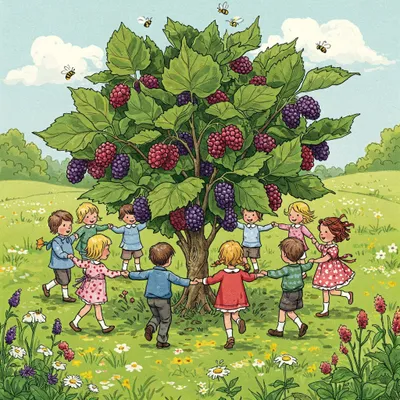Here We Go Round the Mulberry Bush

Lyrics
The mulberry bush,
The mulberry bush.
Here we go round the mulberry bush
On a cold and frosty morning.
This is the way we wash our face,
Wash our face,
Wash our face.
This is the way we wash our face
On a cold and frosty morning.
This is the way we comb our hair,
Comb our hair,
Comb our hair.
This is the way we comb our hair
On a cold and frosty morning.
This is the way we brush our teeth,
Brush our teeth,
Brush our teeth.
This is the way we brush our teeth
On a cold and frosty morning.
This is the way we put on our clothes,
Put on our clothes,
Put on our clothes.
This is the way we put on our clothes
On a cold and frosty morning.
Here we go round the mulberry bush,
The mulberry bush,
The mulberry bush.
Here we go round the mulberry bush
On a cold and frosty morning.
History and Meaning
"Here We Go Round the Mulberry Bush" entered written record in the mid-nineteenth century, though it existed in oral tradition earlier, with similar versions found across Europe. The rhyme involves children forming a circle and dancing while singing the first verse, then breaking formation to act out the described actions like washing clothes or combing hair. Its characteristic refrain "On a cold and frosty morning" has remained constant through generations.
Despite its simple appearance, two fascinating theories ground this rhyme in specific historical contexts. The first connects it to HM Prison Wakefield in Yorkshire, where female prisoners and their children allegedly exercised by walking around a mulberry tree in the prison yard. This theory gained credibility due to the existence of an ancient mulberry tree within the prison grounds that became a celebrated local landmark until succumbing to disease around 2017-2019. The prison embraced this connection, incorporating the mulberry bush into its emblem.
The alternative explanation links the rhyme to Britain's failed attempts to establish a domestic silk industry. Silk production depends on silkworms, which feed primarily on mulberry leaves, but British mulberry trees struggled in the "cold and frosty" climate. According to this interpretation, the rhyme directly comments on the climatic challenges that doomed this ambitious industrial venture.